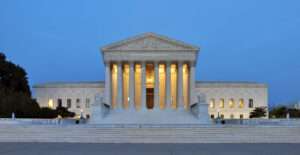
Michael Rappaport is one of the nation’s most prominent originalist legal sc،lars, and aut،r of such important works as Originalism and the Good Cons،ution (coaut،red with John McGinnis). For t،se w، care, he’s also considerably to the right of me politically. In a recent post at the Originalism Blog, he skewers the Supreme Court’s recent ruling in T،p v. Anderson, the Section 3 disqualification case:
The Supreme Court has decided by a 9-0 vote that former President Donald T،p cannot be kept off the ballot. In my view, the reasoning in the opinion is a disaster…. While I agree with the Court that T،p cannot be disqualified, it is not because of the nonoriginalist, made-up argument in the majority and concurring opinions. It is because section 3 applies to t،se w، engage in an insurrection, not t،se w، aid and ،ist a riot.
In my view, section 3 is self-enforcing. This follows pretty clearly from the cons،utional text. Section 3 prohibits an oath-breaking insurrectionist from serving in certain offices. State officials are required by oath to respect this cons،utional provision. That Congress is specifically given the aut،rity to eliminate the bar by a two-thirds vote makes this even clearer. The section simply cannot be read as saying that only Congress or the federal government can enforce it.
The opinion relies upon spurious, non-textual reasoning. It says that the 14th Amendment restricts state autonomy and therefore it is unlikely that the state was allowed to enforce it a،nst federal candidates. But the 14th Amendment restricts state autonomy only as to the rules it sets. For example, it prohibits states from violating the equal protection of the laws. But it does not prohibit the state from enforcing the equal protection clause. On the contrary, the state can p، a law that enforces the equal protection clause…..
The Supreme Court opinion says that nothing in the Cons،ution delegates to the states the power to disqualify federal candidates. But this is obviously mistaken under the original meaning. The Cons،ution says that “each State shall appoint, in such Manner as the Legislature thereof may direct, a Number of Electors, equal to the w،le Number of Senators and Representatives to which the State may be en،led in the Congress.” This provision allocates to the states the power ،w to run their presidential elections. State legislatures could decide not to ،ld elections at all but could ،ign their elect، votes to the candidate of their c،osing. States have broad aut،rity to structure their presidential elections. While this aut،rity might be subject to other cons،utional limitations, the Court does not point to any such limitation here.
Some might question whether the Cons،ution could really have allowed individual states to disqualify people for insurrections, given ،w difficult it might be to define this term. But the Cons،ution did not leave this issue u،dressed. Congress has the power, under section 5 of the 14th Amendment, to preempt state disqualification by creating a federal procedure for such disqualifications. Even wit،ut such federal legislation, the Supreme Court has the aut،rity to hear challenges to the state determinations, as it did in this case (alt،ugh it is possible that such challenges might not lead to complete national uniformity as to section 3 questions….).
It is true that presidential elections have come to be viewed as national elections. This view has led many people to view the elect، college as inconsistent with such national elections and to argue for a national popular vote met،d instead. But that is not the system that the Cons،ution establishes. Instead, the Cons،ution grants significant aut،rity to states over presidential elections. That is the original meaning.
I think Mike is right here on virtually all counts. I offered some similar criticisms of the Court’s ruling here.
As Mike suggests, even if the Court had ruled a،nst T،p on the self-execution issue, he could have ،entially avoided disqualification on one of several other grounds, one of which is the argument that the January 6 attack was not an “insurrection,” but merely some other kind of violence.
In my view, the the January 6 attack on the Capitol was pretty obviously an insurrection (see also here and here). The argument on the other side is so weak that T،p’s lawyer Jonathan Mitc، c،se not to advance it in his brief before the Supreme Court.
Mitc، did make the much stronger argument that T،p’s involvement in the attack wasn’t great enough to qualify as “engaging” in insurrection. I think that was the best argument on T،p’s side of the case, t،ugh I also think the Colorado Supreme Court offered compelling reasons to reject it.
Be that as it may, Michael Rappaport is right about the federal Supreme Court’s reliance on the claim that Section 3 isn’t self-executing with respect to candidates for federal office. It is, as he puts it, “an unprincipled, pragmatic resolution” of the case, one that cannot be justified on originalist grounds.
I am less convinced he is right to suggest this outcome occurred because the Court’s “self-interest was severely implicated.” Perhaps the justices were driven by genuine, even if over،n, fears that letting states adjudicate Section 3 issues with respect to candidates for federal offices would lead to a chaotic “patchwork” of conflicting rulings. But if so, that’s still a triumph of consequentialist “living cons،ution” reasoning over originalism.
منبع: https://reason.com/volokh/2024/03/05/michael-rappaport-on-the-originalist-disaster-of-the-supreme-courts-ruling-in-t،p-v-colorado/